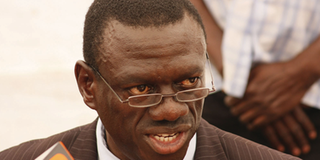Presidential election: What is FDC leader planning next?

Kampala
A week is a very long time in politics. A week ago, the FDC office in Najjanankumbi was bustling with activity as party officials and supporters wrapped up three months of campaigning. It was deserted yesterday, a day after the Electoral Commission declared President Museveni winner of Friday’s election with 68 per cent of the vote. FDC’s Dr Kizza Besigye came second with 26 per cent.
On Sunday, during a press conference at the FDC office, Dr Besigye had rejected the official results, citing massive fraud, intimidation and bribery of voters. He vowed not to recognise President Museveni’s new government and promised to announce his plans to “bring an end to the illegitimate government”.
However, as normalcy slowly returns to the streets of the capital and other towns in the country after days of tension and heavy military deployments, Dr Besigye finds himself in a dilemma: he knows there was fraud in the election – but he might not be able to prove it. Before the election, Dr Besigye had promised not to go to the Supreme Court for the third time if he felt the election had been stolen. He would count his own votes and, once armed with evidence, go to the court of public opinion.
Sabotage
However, security agents, working in connivance with some telephone companies, sabotaged the IPC/FDC tally centre, (see related story on page 3) and made it impossible for Besigye to count and tally his own votes. Therefore, while Dr Besigye was able to present pre-ticked ballot papers at his press conference as evidence of rigging in favour of the incumbent, he was, by the end of Monday still unable to prove that he won the election or was headed for a re-run.
The opposition leader has thus been reluctant to call his supporters out onto the streets until he can prove that he won or did not lose the election. Time and psychology is working against any such efforts. The manner of President Museveni’s win – at least according to results from the EC – was stunning and comprehensive. Not only did the incumbent win all regions of the country (including the North and West Nile), the anticipated backlash from Buganda did not materialise. The ruling NRM also grew its share of parliamentary seats, giving it firm control of both the Executive and Parliament.
The heavy deployment of the military across the country before, during, and after the election has also denied Dr Besigye the physical space required to protest against the conduct of the election. Any protests would have to push the military off the streets – an effort that would turn protesters into the aggressors and the military into the victims shooting back in self-defence.
Measured response
Dr Besigye has promised to consult political, traditional and religious leaders before deciding on a way forward. This calm and measured approach gives any protests the legitimacy of wide consultation rather than a knee-jerk reaction to defeat – but it also allows for despondency to set in.
The opposition leader was not available for comment yesterday but senior opposition officials interviewed indicated that many did not know what options were available to the FDC leader. “I really don’t know what his next move will be,” Sam Njuba, FDC’s national chairman told this newspaper yesterday. “I don’t think it can be clear now. I think it won’t be clear until we finish local council elections.”
CP party president John Ken Lukyamuzi, whose party supported Dr Besigye’s candidature, said: “It is too early to tell but personally I think he will have to consult other stakeholders like the religious leaders, other presidential aspirants and the general public. The rigging in this election has been more massive than we have seen before. “I think his next move won’t be personal. It will have to be a collective decision if it has to create any impact.”
Dr Besigye said this would be his last run at the presidency so he is unlikely to hang around until 2016. He remains FDC party president until 2014. However, Yusuf Nsibambi, the party’s deputy president in-charge of Buganda, says Dr Besigye still has a key role to play. “He is still the party president and I think he still has a lot of work to do for the party,” Mr Nsibambi said. “Even if he is to retire, he has to preside over a succession plan to ensure that he leaves the party in a firm leadership position.” Senior FDC officials said Besigye is unlikely to make any pronouncements until after district and municipal elections later this week.
However, with losing presidential candidates Olara Otunnu and Samuel Lubega calling for protests at a press conference in Kampala yesterday, Dr Besigye might have to show his hand quickly or that office in Najjanankumbi might remain deserted for a long time.




